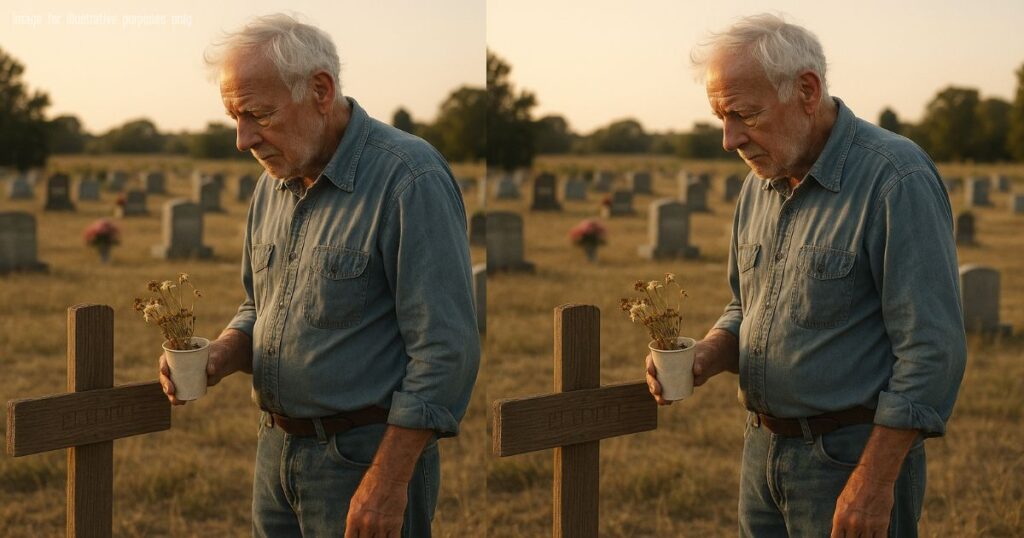A week after we found the bench, I went back to the church where we buried her.
I hadn’t been in over a year.
The cemetery wasn’t much — just a patch of grass behind the chapel, with crooked stones and sun-bleached names. Her grave was still there, between two sugar maples. The little wooden cross was cracked, the ground settled in.
No flowers.
Still.
I sat beside it and pulled the small paper cup from my coat pocket — the one the little girl gave me, with the dried clover and dandelions. I’d kept it all this time, tucked next to the ignition in my truck.
I set it down by the stone.
“I’m planting again,” I said quietly. “Back at the ridge. Your niece — she remembered you. The boy too.”
The wind shifted.
Carried a scent I hadn’t smelled in decades.
Sweet. Earthy. Familiar.
I turned.
Behind me, just past the fence, stood a patch of wild roses. Pink, untamed, curling along the edge of the woods.
I walked to them.
Knees cracking.
Hands trembling.
Cut one with my pocketknife.
Took it back and laid it on her grave.
It was the first flower she’d had.
And it came from the soil we once called ours.
—
That summer, we finished the garden.
Not the kind you see in magazines. It was messy in places. The fence leaned. A birdbath had a crack. But it bloomed.
Sunflowers. Lavender. Bee balm. And yes — roses. Not the store-bought kind. The climbing kind, the stubborn kind. The kind that grow sideways when the wind pushes too hard.
Just like people.
I came by every Saturday. Not for work anymore. Just to sit on the bench, watch the bees, and teach the boy how to keep the soil breathing.
Sometimes he’d ask about her.
“What was her favorite color?”
“Did she sing?”
“What made her laugh?”
I answered every time.
And sometimes, when the light hit just right, I’d hear her in the wind.
The humming.
The kind she did over biscuits.
—
One afternoon in early fall, the woman — Mary’s niece — brought out a small box. Wooden, polished, with a brass latch.
“I found this in the attic,” she said. “Thought you should have it.”
Inside were letters.
Old ones.
Tied with ribbon.
Dozens.
Every one addressed to me.
Some were never sent. Others I remembered getting long ago, before phones, before email. But one caught my eye. It was dated just a few weeks before she passed.
“For Eli — To be read when the roses bloom.”
I sat on the bench and opened it.
The ink had faded a bit, but I could still make it out.
Eli,
You always said you were no good with words, but you gave me the most beautiful life without ever needing them. If you’re reading this, then something is blooming, and I hope it’s not just the garden.
Don’t be sad, love. I was never without flowers. You brought me one every time you came home. Not in your hands — but in your eyes, your stories, your quiet.
You planted love in everything you touched.
Don’t stop now.
Someone out there still needs to know how to grow.
Yours always,
Mary
I didn’t cry.
Not right away.
I just held the letter to my chest, like I was holding her hand again.
And I sat there until the sun sank low, and the first of the crickets began to sing.
—
That winter, I started teaching gardening at the local community center. Once a week. Free.
Some came because they were lonely. Some because they were tired of screens. A few just wanted to grow tomatoes that didn’t taste like plastic.
I didn’t talk much.
Just showed them how to feel the dirt. How to listen.
How to wait.
The boy was always there. Sat in front, asked questions. I gave him my old spade. Told him it was time.
Time to dig. Time to remember.
And when spring came back, that ridge bloomed again — this time without my hands.
But with everything I left behind.
—
They paid me to plant roses.
But in the end, the greatest thing I ever grew was a memory that didn’t die.
And the quiet, steady truth that love — real love — doesn’t need bouquets.
It needs roots.
And someone willing to stay long enough to water them.


